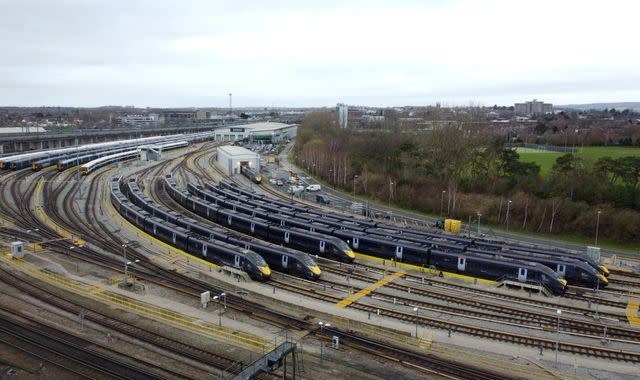Labour denies railways will be given 'lower priority' under renationalisation plans - as Tories warn of 'wildcat strikes'

Labour has denied the railways will be given "lower priority" if they are brought back into public ownership as the party pledged to "sweep away" the current "broken" model.
Shadow transport secretary Louise Haigh promised to deliver the biggest shake-up to rail "in a generation" by establishing the long-delayed Great British Railways (GBR) organisation and bringing routes back into public ownership, if Labour forms the next government.
In a speech, Ms Haigh also pledged to establish a "best-price ticket guarantee" for travellers, offer automatic "delay repay" schemes and make digital season tickets available across the network.
But the proposals have been attacked by the Conservatives, who have claimed Labour has no plan to pay for them.
Sam Coates, Sky News' deputy political editor, asked Ms Haigh how she was going to avoid the "trap" of British Railways - the former national railway system that was privatised in the 1990s - which was forced to compete for central government cash.
Politics latest: Migrants picked for first Rwanda flights, Number 10 says
"How are you going to make sure that you don't end up falling into the same old trap as British Railways, where effectively, to get train upgrades, you are competing for cash with schools and hospitals, and given money is going to be very tight, aren't the trains actually going to be a lower priority?" he asked.
Ms Haigh admitted the UK was in a "very constrained public spending environment" but said the reforms the party was setting out would deliver "significant efficiencies and cost savings for the taxpayer".
"As I've said earlier, the taxpayer simply can't afford to continue with the current broken model that is throwing good money after bad and wasting very, very stretched taxpayers' money," she argued.
Click to subscribe to the Sky News Daily wherever you get your podcasts
The shadow transport secretary also said she hoped she would be able to "reinvest some of those savings" created by the new efficiencies in the system but admitted she had not struck an "agreement" with Rachel Reeves, the shadow chancellor, "that all of it would be".
GBR was first proposed in 2021 after a review of the railways, with the aim of simplifying the franchise system and rebuilding passenger numbers after they fell dramatically during the COVID pandemic.
The proposed public body promised to subsume Network Rail's responsibility for track and stations, as well as taking charge of ticketing, timetables and network planning.
But despite getting backing from Boris Johnson and his ministers, its establishment has faced continuous delays and the organisation has yet to see the light of day.
Labour is now pledging to get GBR up and running if they win the next election, with some additional pledges of their own.
The party said the body, which would be run by industry experts rather than government officials, would end the "fragmentation, waste [and] bureaucracy" of the current network.
And it would "stop profits leaking out to private operators" by taking charge of passenger lines when franchises run out - leading eventually to the whole passenger network being publicly owned.
Labour said this method would prevent taxpayers from having to cover any compensation to the operators that would be due if they renationalised the railways immediately.
The party also pledged to create a new independent watchdog called the Passenger Standards Authority to ensure GBR keeps up its standards.
And it committed to introducing a statutory duty on GBR to promote the use of rail freight - still owned by private firms - to cut carbon emissions and reduce lorry traffic.
The proposals have won the backing of Keith Williams - one of the experts behind the rail review - who recommended the creation of GBR three years ago.
He said its creation would "deliver a better railway for passengers and freight", adding: "Running a better railway and driving revenue and reducing costs will deliver economic growth, jobs and housing by delivering better connectivity."
But the Conservative Transport Secretary Mark Harper said Labour's plan was "unfunded" and that that there was "nothing in it to improve services for passengers".
"The other thing that people need to understand is what is the damage that will be done by Angela Rayner's plan to reverse all our trade union legislation.
"You're going to go back to French style, wildcat strikes with no notice.
"It's not surprising the unions have welcomed Labour's plans - it puts them back in the driving seat."


